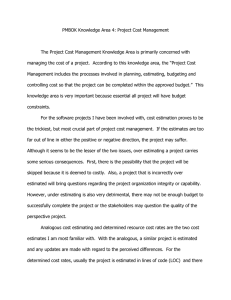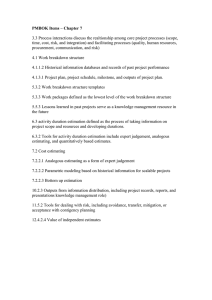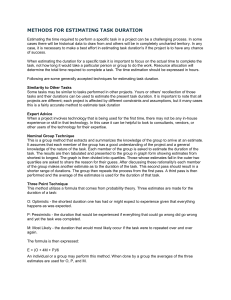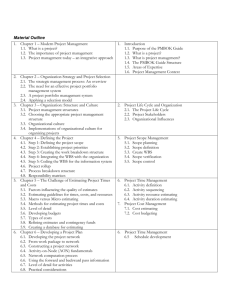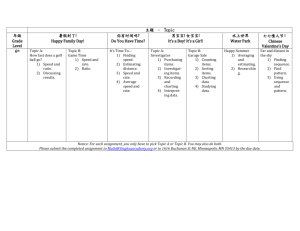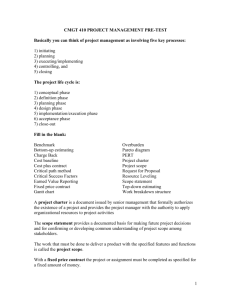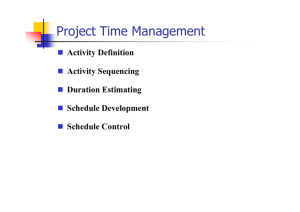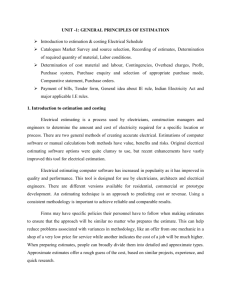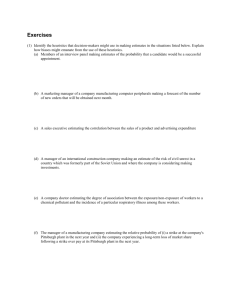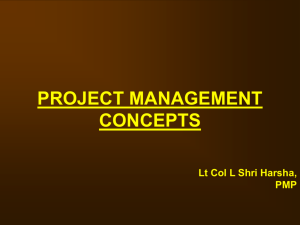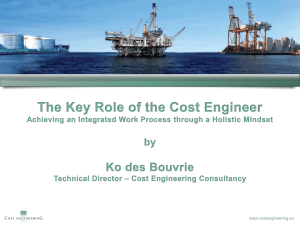Table mapping text to the PMI's PMBOK (3rd edition)
advertisement
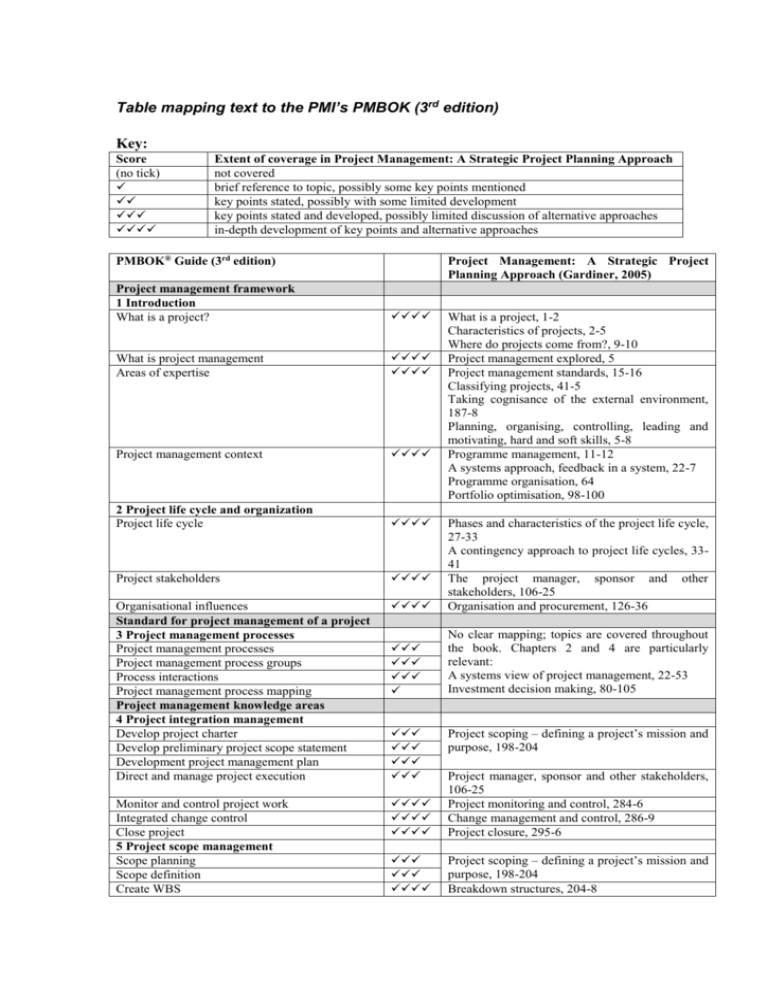
Table mapping text to the PMI’s PMBOK (3rd edition) Key: Score (no tick) Extent of coverage in Project Management: A Strategic Project Planning Approach not covered brief reference to topic, possibly some key points mentioned key points stated, possibly with some limited development key points stated and developed, possibly limited discussion of alternative approaches in-depth development of key points and alternative approaches PMBOK® Guide (3rd edition) Project Management: A Strategic Project Planning Approach (Gardiner, 2005) Project management framework 1 Introduction What is a project? What is project management Areas of expertise Project management context 2 Project life cycle and organization Project life cycle Project stakeholders Organisational influences Standard for project management of a project 3 Project management processes Project management processes Project management process groups Process interactions Project management process mapping Project management knowledge areas 4 Project integration management Develop project charter Develop preliminary project scope statement Development project management plan Direct and manage project execution Phases and characteristics of the project life cycle, 27-33 A contingency approach to project life cycles, 3341 The project manager, sponsor and other stakeholders, 106-25 Organisation and procurement, 126-36 No clear mapping; topics are covered throughout the book. Chapters 2 and 4 are particularly relevant: A systems view of project management, 22-53 Investment decision making, 80-105 Monitor and control project work Integrated change control Close project 5 Project scope management Scope planning Scope definition Create WBS Project manager, sponsor and other stakeholders, 106-25 Project monitoring and control, 284-6 Change management and control, 286-9 Project closure, 295-6 Project scoping – defining a project’s mission and purpose, 198-204 Breakdown structures, 204-8 What is a project, 1-2 Characteristics of projects, 2-5 Where do projects come from?, 9-10 Project management explored, 5 Project management standards, 15-16 Classifying projects, 41-5 Taking cognisance of the external environment, 187-8 Planning, organising, controlling, leading and motivating, hard and soft skills, 5-8 Programme management, 11-12 A systems approach, feedback in a system, 22-7 Programme organisation, 64 Portfolio optimisation, 98-100 Project scoping – defining a project’s mission and purpose, 198-204 Scope verification Scope control 6 Project time management Activity definition Activity sequencing Activity resource estimating Activity duration estimating Schedule development Schedule control 7 Project cost management Cost estimating Cost budgeting Cost control 8 Project quality management Quality planning Perform quality assurance Perform quality control Quality management, 176-84 Quality management processes, 184 Cost of quality, 184-5 Quality control tools, 185-7 9 Project human resource management Human resource planning Acquire project team Develop project team Manage project team The organisation breakdown structure, 208-209 The project team and team building, 210-14 Leadership role of the project manager, 107-12 Models for team development, 214-29 Limitations of team building, 229-30 10 Project communications management Communications planning Information distribution Performance reporting Manage stakeholders The four pillars model of effective teams, 222-9 11 Project risk management Risk management planning Risk identification Qualitative risk analysis Quantitative risk analysis Risk response planning Risk monitoring and control Risk management planning, 163-4 Identification of risks, 164-5 Analysis and prioritisation, 165-6 12 Project procurement management Plan purchases and acquisitions Plan contracting Request seller responses Select sellers Contract administration Requirements planning, 137-9 Contract terms of payment, 143-5 Incentive contracting, 145-8 Solicitation, 139-41 Programme governance, 61-4 Project closure, 295-6 Scope-time-cost triangle, 202-4 Change management and control, 286-9 Breakdown structures, 204-8 Defining activity dependencies and creating a project network, 246-54 Resource planning, 266-7 Estimating activity durations, 245 Issues in estimating duration, 245-6 Critical chain project management, 300-5 Adding people and optimising the schedule, 25460 Project monitoring and control, 284-286 Milestone monitoring, 289-290 Project control using earned value analysis, 291-4 Cost estimating, 267 Tools and techniques for cost estimating, 267-8 Cost budgeting, 268-70 Cash flow projections, 270-7 Project monitoring and control, 284-6 Milestone monitoring, 289-90 Project control using earned value analysis, 291-4 Project manager, sponsor and other stakeholders, 106-25 Risk response planning, 166-8 Risk monitoring and reporting, 168-9 Contingency planning - if all else fails…, 169 Useful tools to help manage risk, 169-73 Awarding, 141-2 Contract administration, 142-3 Contract closure Project closure, 295-6
